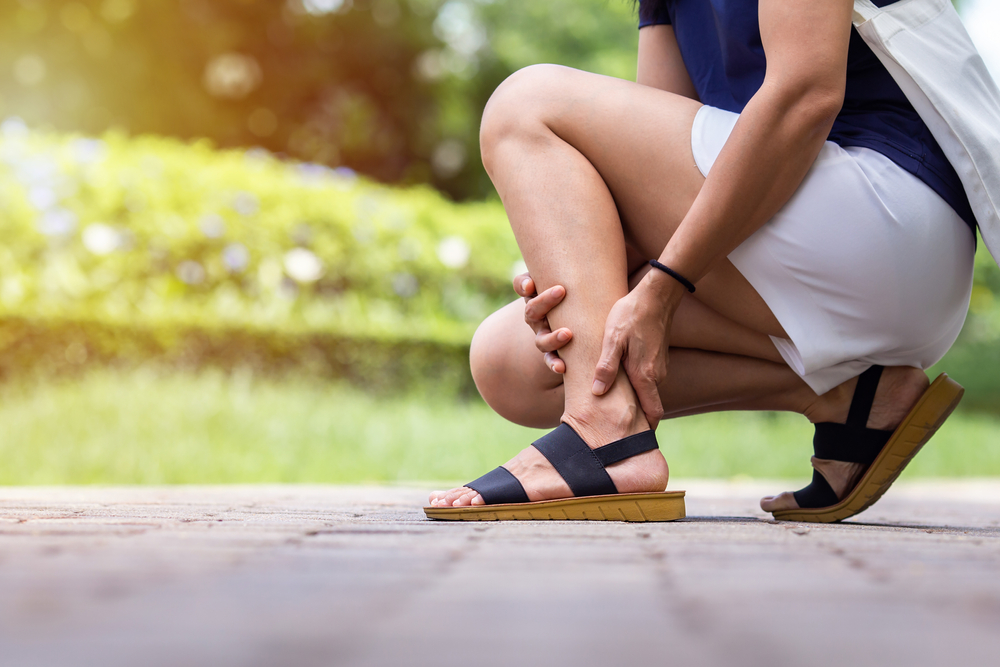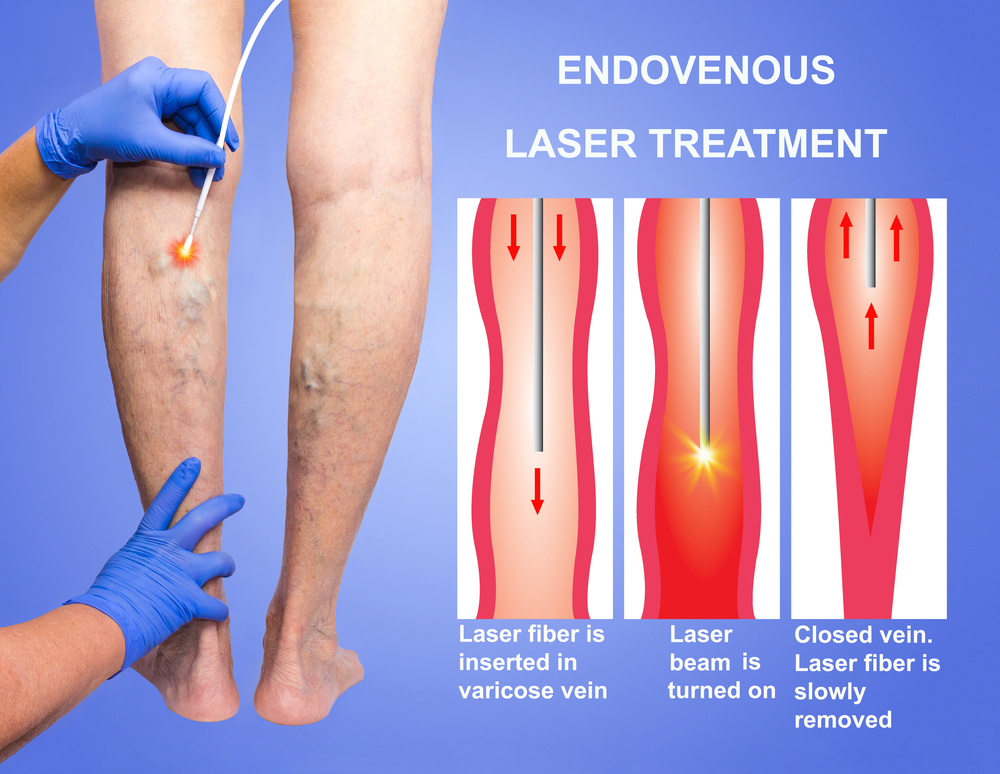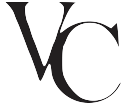Endovenous laser treatment for varicose veins is a minimally invasive procedure that uses laser energy to close off damaged veins. It effectively reduces pain, swelling, and the unsightly appearance of varicose veins. In this article, we’ll cover how it works, its benefits, and what to expect before and after the procedure.
Endovenous Lasers at a Glance
- Endovenous laser treatment (EVLT) effectively closes damaged varicose veins by using laser heat, thereby restoring normal blood flow and alleviating associated symptoms.
- Preparation for EVLT involves a comprehensive health review, discontinuation of certain medications, and signing a consent form, ensuring patient safety and understanding of the procedure.
- The treatment is associated with high success rates, low recurrence of symptoms, and variable costs that may be covered by insurance if deemed medically necessary.
Understanding Endovenous Laser Treatment
Varicose veins develop when the one-way valves in the veins, which ensure blood flows toward the heart, become weak or damaged. This malfunction causes blood to pool in the veins, leading to swollen, twisted blood vessels that bulge under the skin. Endovenous laser treatment, also known as EVLT, is designed to address this issue by using heat generated from lasers to seal off these problematic veins and prevent vein blood clots.
During the procedure, a thin laser fiber is inserted into the damaged vein through a small incision. The laser emits a precise beam of energy that heats and closes the vein, causing it to shrink.
Once the vein is sealed, blood naturally reroutes to healthier veins, restoring normal blood flow. This process not only reduces the appearance of varicose veins but also alleviates associated symptoms such as pain and swelling.
Reasons to Consider Endovenous Laser Treatment

Many individuals seek endovenous laser treatment for a variety of reasons. Medically, varicose veins can cause significant pain, swelling, and irritation, which can impact daily activities and overall quality of life. For those experiencing severe discomfort, this treatment can provide much-needed relief.
Furthermore, varicose veins often lead to red, swollen, or inflamed skin, prompting medical professionals to suggest laser surgery as a viable option. For others, the cosmetic aspect of varicose veins cannot be overlooked. Bulging veins can be unsightly and affect one’s self-esteem, making EVLT an attractive solution for those seeking both functional and aesthetic improvements.
Ultimately, the decision to undergo endovenous laser treatment often stems from a combination of medical necessity and a desire for cosmetic enhancement. Whether driven by pain, cosmetic concerns, or both, patients find that EVLT offers a comprehensive solution to reduce varicose veins effectively.
Preparation for the Procedure
Preparation for endovenous laser treatment starts with a detailed health history review. Your healthcare provider will inquire about any known bleeding disorders and medications you are taking, especially blood-thinning medicines like aspirin or ibuprofen, which could affect blood clotting during the procedure. Discontinuing herbal supplements and vitamins a week prior is also commonly advised to prevent complications.
Before the procedure, you will need to sign a consent form, which outlines the risks and benefits of the surgery. Your healthcare provider will also explain the procedure in detail, ensuring you understand what to expect and any pre-procedure instructions, such as dietary guidelines. Unlike many surgical procedures, fasting is not required; you can eat and drink normally on the day of your laser procedure. In fact, it is recommended that you eat before your procedure.
Comfortable clothing is recommended for the day of the procedure, and it’s advisable to bring loose-fitting garments to wear afterwards. Your legs will be fitted with compression bandages and compression stockings, which can be bulky. Following these preparation steps ensures a smoother experience and helps minimize potential complications during and after the procedure.

The Procedure: What to Expect
Endovenous laser surgery is typically performed in an outpatient treatment center and usually lasts under an hour. The procedure begins with a small incision near the knee, through which a catheter is inserted into the varicose vein. A thin laser fiber is then threaded through the catheter to the damaged area of the vein during varicose vein surgery.
Local anesthesia is applied to numb the treatment area, ensuring patient comfort throughout the procedure. A Doppler ultrasound device is utilized to visualize the vein and guide the placement of the laser fiber accurately. As the healthcare provider slowly pulls back the laser fiber, it emits heat, sealing the vein and causing it to collapse. This minimally invasive procedure requires no stitches and results in minimal discomfort.
After the procedure, you may notice a light pink fluid at the incision sites, which is normal and should subside quickly. The entire process is usually well-tolerated with a quick recovery time, allowing patients to resume their daily activities soon after.
Post-Procedure Care and Recovery
Recovery after endovenous laser treatment involves several important steps to ensure optimal healing. Patients are typically advised to walk for 30 to 60 minutes immediately after the procedure to promote blood circulation and prevent complications. Prolonged sitting or lying down should be avoided to further enhance recovery.
Compression stockings play a crucial role in post-procedure care. These stockings gently squeeze the legs to prevent swelling and support the healing process. Without wearing compression stockings, the veins can potentially reopen. Patients are often instructed to wear them for a few days to several weeks, depending on their healthcare provider’s recommendations. Bruising around the treated area is common and should subside within two weeks.
To minimize swelling, applying an ice pack to the treated area can be beneficial. It’s also essential to keep incision sites dry and refrain from submerging them in water for at least 48 hours post-procedure. Any signs of increased redness, swelling, or other symptoms of infection should be reported to your healthcare provider immediately.
Potential Risks and Complications
Like any medical procedure, endovenous laser treatment comes with its own set of risks and potential complications. Common side effects include infection at the treatment site, which can usually be managed with antibiotics if caught early. Bleeding is another possibility, either during or after the procedure.
Patients may also experience bruising, swelling, and localized pain over the treated vein. While these symptoms are typically temporary, they can cause discomfort during the initial recovery period. In rare cases, nerve damage can occur, leading to numbness or tingling in the affected area.
More serious complications include blood clots, which require immediate medical attention. Skin burns are a potential risk due to the heat generated by the laser. Despite these risks, the majority of patients undergo EVLT without experiencing significant issues, making it a safe and effective treatment option for many.
Effectiveness of Endovenous Laser Treatment

Endovenous laser varicose vein treatment boasts impressive success rates, with studies showing a 95% to 100% success rate within six months post-treatment. This high efficacy is one of the primary reasons why healthcare providers often suggest laser surgery for varicose veins. The procedure effectively closes off the problematic veins, reducing symptoms and improving the appearance of the affected area.
Long-term results are also promising, with recurrence rates for EVLT and radiofrequency ablation (RF) being relatively low at 12 months—6.7% and 5.7%, respectively. Patient satisfaction is high, with about 93% of individuals reporting symptom relief at follow-up. Pain severity immediately after the procedure is generally mild and comparable between EVLT and RF treatments.
These statistics underscore the effectiveness of endovenous laser treatment in managing varicose veins. Patients can expect significant improvement in both symptoms and cosmetic appearance, making EVLT a highly recommended option for those suffering from varicose veins.
Costs and Insurance Coverage
The cost of endovenous laser treatment can vary widely, ranging from approximately $1,000 to $3,000 on average. Factors influencing the cost include the severity of the varicose veins, the healthcare provider’s experience, and the geographical location of the treatment center. Without insurance, the total cost for varicose vein treatments can cost over $13,000 per procedure.
Insurance coverage for EVLT depends on whether the treatment is deemed medically necessary. Most insurance plans, including Medicare, will cover varicose vein treatments if a healthcare provider documents the medical necessity. For cosmetic treatments, however, coverage is generally not provided. Patients can reduce out-of-pocket costs by choosing in-network providers and obtaining estimates from multiple providers.
It’s advisable to check with your insurance provider beforehand to understand your coverage and any potential out-of-pocket expenses. This proactive approach can help you manage the financial aspects of your treatment more effectively.
For insurance plans accepted at The Vein Centre, visit our Insurance page for a comprehensive list.
Alternative Treatments
While endovenous laser treatment is highly effective, it is not the only option available for treating varicose veins. Sclerotherapy is a popular non-surgical alternative that involves injecting a solution into the affected vein, causing it to collapse and eventually fade. Treatment sessions typically last about 30 to 45 minutes and can be performed in an outpatient setting.
Radiofrequency ablation is another effective alternative that uses radio waves to heat and close the vein. This method is often considered less painful than traditional surgery and has a quicker recovery time. Both sclerotherapy and radiofrequency ablation offer viable options depending on the patient’s specific condition and preferences.
Consulting with a healthcare provider can help determine the most suitable treatment option for your varicose veins. Each method has its own benefits and potential drawbacks, so understanding these can assist in making an informed decision.
Finding a Specialist
Choosing the right specialist is crucial for the success of your varicose vein treatment. It’s important to seek clinics that have board-certified vein specialists who have undergone rigorous training and assessments. Investigating the educational background of these specialists can also provide insight into their level of expertise and training.
Additionally, ensure that your chosen vein specialist is proficient in vascular imaging techniques like Doppler ultrasound, which is essential for accurate diagnosis and treatment. Reviewing the track record of the vein doctor, including their experience and the number of successful treatments performed, can further guide your decision.
Opting for treatment centers with advanced technologies and minimally invasive procedures can enhance your treatment outcomes. Taking these steps can help you find a qualified specialist who can provide the best care for your varicose veins, ensuring a successful and satisfactory treatment experience.
Next Steps After Treatment
Follow-up care is a critical component of the endovenous laser treatment process. Typically, follow-up exams are scheduled to assess the effectiveness of the procedure and ensure that the treated veins are healing properly. These exams help healthcare providers monitor your progress and address any complications that may arise.
Based on the results of these follow-up exams, additional treatments or steps may be recommended to enhance the outcomes. This ongoing care is essential for maintaining the benefits of the initial treatment and ensuring long-term success.
Related Conditions and Procedures
Varicose veins are often a symptom of underlying chronic venous insufficiency, a condition that, if left untreated, can lead to severe pain and the development of venous ulcers around the ankles.
To diagnose such conditions, various diagnostic tests are employed, including:
- Duplex ultrasound
- Magnetic resonance venogram
- CT venogram
- Venogram
A duplex ultrasound helps visualize blood flow direction and identify deep vein thrombosis in the legs. Magnetic resonance venograms can reveal blockages and valve issues deep within the leg veins, providing a comprehensive view of the venous system. CT venograms use X-rays and contrast dye to assess blood flow and detect vein blood clot changes in deep leg veins.
These diagnostic tools are crucial for identifying and managing related conditions, ensuring that patients receive the most appropriate and effective treatment for their venous issues.
Summary
In summary, endovenous laser treatment offers a highly effective solution for those suffering from varicose veins. By sealing off the problematic veins and rerouting blood flow to healthier veins, this minimally invasive procedure provides significant relief from pain and improves the cosmetic appearance of the affected areas. Preparation, proper post-procedure care, and understanding potential risks are essential for a successful outcome.
For those considering EVLT, it’s important to weigh the benefits and risks, consult with qualified specialists, and explore all available treatment options. With the right care and follow-up, endovenous laser treatment can transform the lives of those affected by varicose veins, restoring both comfort and confidence.
Take the Next Step with Endovenous Laser Treatment
If you are struggling with the discomfort and unsightly appearance of varicose veins, take the first step towards relief by considering endovenous laser treatment at The Vein Centre in Nashville, TN. Our team of experienced specialists is committed to providing personalized care and advanced treatment options to help you achieve healthier, more comfortable legs. Schedule a consultation today to learn more about how our minimally invasive procedures can transform your quality of life and restore your confidence. Don’t let varicose veins hold you back any longer—contact The Vein Centre and start your journey to improved vascular health.



